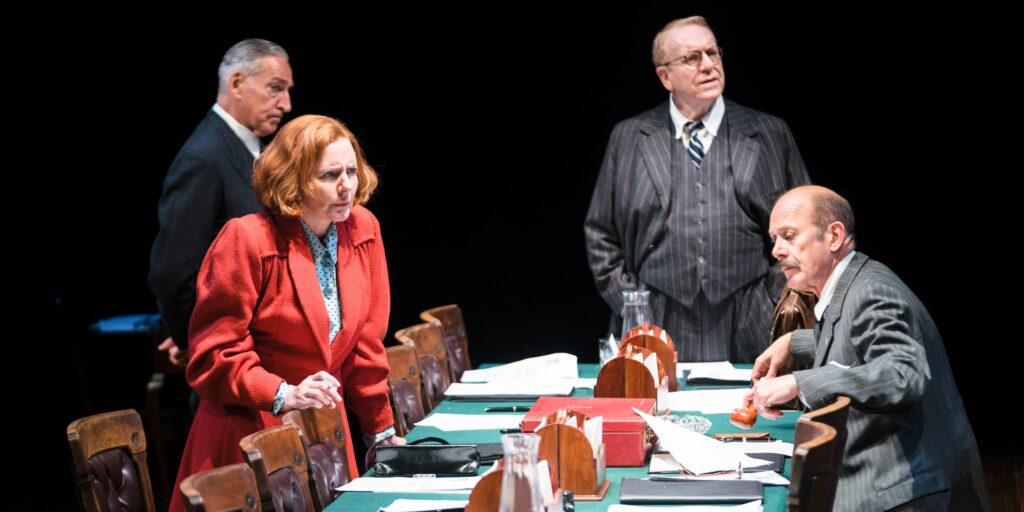
The Promise
Chichester Minerva Theatre
July 19 – August 17 2024
Written by Paul Unwin
Directed by Jonathan Kent
The Labour Party has just won a landslide victory over the Tories. They promise to build millions of new homes, no more mouldy damp social housing and schools, get the economy on track and address the Palestine question. The new leader ‘lacks charisma’ and one of his most prominent cabinet members is a redheaded outspoken northern female. Sound familiar? But this play is set not in 2024, but firmly in 1945 immediately following the end of the second world war.
The Chichester Minerva Theatre is a much smaller space compared with its big sister The Festival next door, however it is capable of delivering huge productions, with an incredible force, in the intimacy of its compact auditorium. Such was ‘The Promise’, a massively ambitious work from the exceptionally talented Paul Unwin. The play hits you slam in the face right from the opening speech delivered by Clare Burt as Ellen Wilkinson, the left wing ‘firebrand’ from Manchester, rarely spoken of today, quite astonishingly. Barbara Castle has had much written about her over the years and is oft referred to in similar terms, however Ellen Wilkinson remains largely forgotten.
‘The Promise’ features Ellen in the central role, the only woman surrounded by a cabinet of 35 men, and, quite rightly, dominates this superb production. Clare Burt throws everything into her part, including the kitchen sink; her vehement language, impassioned speech and inexhaustible energy is unrelenting. Despite chain smoking her way through her short life (she died aged 55) whilst suffering from various pulmonary afflictions, she fought to the end. We should take note that ‘Red’ Ellen led the Jarrow Marchers, worked to improve school infrastructure and raised the school leaving age. Clare Burt does her proud.
Of course, the other central point of this play is the inception of the National Health Service, and the furore and fiercely conflicting opinions about it within the Labour Party. Nye Bevan, sympathetically and amiably played by the excellent Richard Harrington, could have had a bigger part, in my opinion, however he managed to convey his own passion and persistence in making a welfare state, free at the point of need, to become a reality, firmly supported by Ellen. Outwardly his benign and evenly spoken Welsh tones, disguised his staggering commitment to his cause and his unwavering beliefs in the face of animosity and derision. Both Ellen and Nye were children born into poverty, Ellen’s parents unable to afford healthcare for her, and Nye’s father, a miner, dying from crippling lung disease.
Andrew Woodall convincingly delivered a subtly understated Clement Attlee, which belied his intellect and doggedness. Enter Reece Dinsdale as Herbert Morrison (Peter Mandelson’s grandfather) the loud political heavyweight and formerly Churchill’s Home Secretary. A would be charmer, scheming his way to the top, Morrison was the second married man with whom Ellen had an affair, but with her very much in the feminist driving seat.
Martyn Ellis as Winston Churchill played his part convincingly, making an appearance towards the end of the play, although his speech was a tad long, and possibly the very last scene could be tweaked a little, it didn’t quite work for me. However, this is a small detail.
The casting of ‘The Promise’ was inspired; reconstructing the huge personalities of every one of Attlee’s cabinet, each demonstrating character traits which conveyed the power, the passion and the plotting within this post WW2 newly elected party. With Miles Richardson, Suzanne Burden, David Robb and others all delivering top notch performances, they jointly conveyed the momentous circumstances surrounding Nye Bevan’s battle to persuade both his party and the country that a National Health Service was the only way forward. Eradicating the terrible lack of health care available to the poorest and most needy in the country had long been Bevan’s raison d’être; It is inconceivable today that people died because they could not afford a visit to the GP or even a prescription, let alone treatment. Many thought the introduction of a free care system for life was totally insane, and could never be sustained. Today the NHS is suffering major wobbles, but to be without it is truly unimaginable.
I would like here to credit the Lighting and Video Designer (Peter Mumford) for his incredible projected scenes on the backdrop, and the set designer (Joanna Parker) for her brilliant use of prop transitions. Also thanks to Helen Murray for some great production photographs.
This play is a towering production, so very timely and relevant, never releasing you from its grasp at any point. Quite honestly, it left me breathless.
2 hours 30 minutes including a 20 minute interval
Reviewer: Gill Ranson
